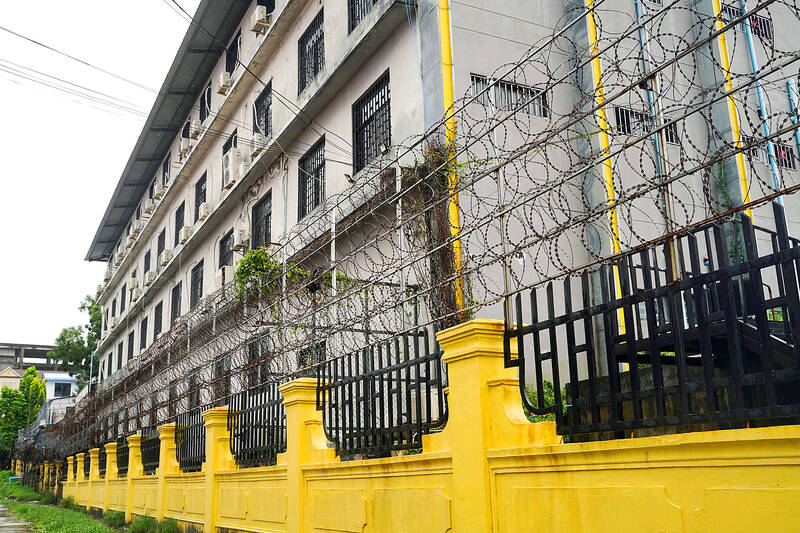Cambodian authorities said raids are underway this week at suspected cybercrime compounds across the Southeast Asian country, uncovering evidence of human trafficking, illegal confinement and torture.
Regional governments and human rights workers have heaped pressure on Cambodia in the past few months to rein in transnational crime rackets that traffic people into the country from across Asia and beyond to work in illegal gambling and linked scam call centers.
Taiwan’s Criminal Investigation Bureau earlier this month said that 11 Taiwanese who were among 373 believed to have been trafficked to Cambodia have returned.

Photo: Reuters
Cambodian officials have for months denied reports of abuses and trafficking, but senior officials including Cambodian Prime Minister Hun Sen have taken a harder stance in the past few weeks amid heightened media attention, ordering a crackdown on the shadowy scam operators.
Cambodian National Police spokesperson Chhay Kim Khoeun on Tuesday said that raids were ongoing and police would inform the public of the results when they were complete.
Authorities in the coastal town of Sihanoukville on Monday said they had found evidence of illegal gambling, illegal confinement, torture, prostitution, illegal possession of weapons, money laundering and human trafficking after a five-day operation targeting one business.
More than 8,000 phones, 804 computers, 36 passports and eight Tasers were confiscated, they said in a statement.
Similar raids were reported elsewhere through the weekend and into Monday.
Victims of the cybercrime racket, including many skilled workers with tech expertise, have said they were lured to Cambodia through social media advertisements promising high-paying jobs at casinos and hotels, but were then forced by racketeers to live in compounds and defraud strangers across the globe through Internet romance and cryptocurrency scams.
People who have fled such compounds in the past few months have reported being detained against their will under brutal conditions.
The UN human rights envoy to Cambodia, Vitit Muntarbhorn, last month said that victims were enduring a “living hell,” sometimes resulting in death.
He said that victims are being held in maze-like compounds surrounded by high walls and barbed wire, with no contact with the outside world and sometimes subject to torture for failing to meet the racketeers’ targets.
“There have been reports of tragic situations of victims fleeing by jumping from their walled buildings to try to escape,” he said in an article published in the Bangkok Post this month.
Cambodian and Thai authorities have previously said the wider racket is Chinese-run, but have not provided details.
Jeremy Douglas, the UN Office on Drugs and Crime representative for Southeast Asia and the Pacific, said the raids were a good start, but that the underlying causes needed to be addressed.
“It is fine to move on locations like we’ve seen in recent days, but if authorities react case-by-case, the groups involved will just jump to new locations and the situation won’t really change — these centers can be moved quickly,” he said.
Additional reporting by staff writer, with CNA

Former Nicaraguan president Violeta Chamorro, who brought peace to Nicaragua after years of war and was the first woman elected president in the Americas, died on Saturday at the age of 95, her family said. Chamorro, who ruled the poor Central American country from 1990 to 1997, “died in peace, surrounded by the affection and love of her children,” said a statement issued by her four children. As president, Chamorro ended a civil war that had raged for much of the 1980s as US-backed rebels known as the “Contras” fought the leftist Sandinista government. That conflict made Nicaragua one of

COMPETITION: The US and Russia make up about 90 percent of the world stockpile and are adding new versions, while China’s nuclear force is steadily rising, SIPRI said Most of the world’s nuclear-armed states continued to modernize their arsenals last year, setting the stage for a new nuclear arms race, the Stockholm International Peace Research Institute (SIPRI) said yesterday. Nuclear powers including the US and Russia — which account for about 90 percent of the world’s stockpile — had spent time last year “upgrading existing weapons and adding newer versions,” researchers said. Since the end of the Cold War, old warheads have generally been dismantled quicker than new ones have been deployed, resulting in a decrease in the overall number of warheads. However, SIPRI said that the trend was likely

NUCLEAR WARNING: Elites are carelessly fomenting fear and tensions between nuclear powers, perhaps because they have access to shelters, Tulsi Gabbard said After a trip to Hiroshima, US Director of National Intelligence Tulsi Gabbard on Tuesday warned that “warmongers” were pushing the world to the brink of nuclear war. Gabbard did not specify her concerns. Gabbard posted on social media a video of grisly footage from the world’s first nuclear attack and of her staring reflectively at the Hiroshima Peace Memorial. On Aug. 6, 1945, the US obliterated Hiroshima, killing 140,000 people in the explosion and by the end of the year from the uranium bomb’s effects. Three days later, a US plane dropped a plutonium bomb on Nagasaki, leaving abut 74,000 people dead by the

Indian Prime Minister Narendra Modi is to visit Canada next week, his first since relations plummeted after the assassination of a Canadian Sikh separatist in Vancouver, triggering diplomatic expulsions and hitting trade. Analysts hope it is a step toward repairing ties that soured in 2023, after then-Canadian prime minister Justin Trudeau pointed the finger at New Delhi’s involvement in murdering Hardeep Singh Nijjar, claims India furiously denied. An invitation extended by new Canadian Prime Minister Mark Carney to Modi to attend the G7 leaders summit in Canada offers a chance to “reset” relations, former Indian diplomat Harsh Vardhan Shringla said. “This is a